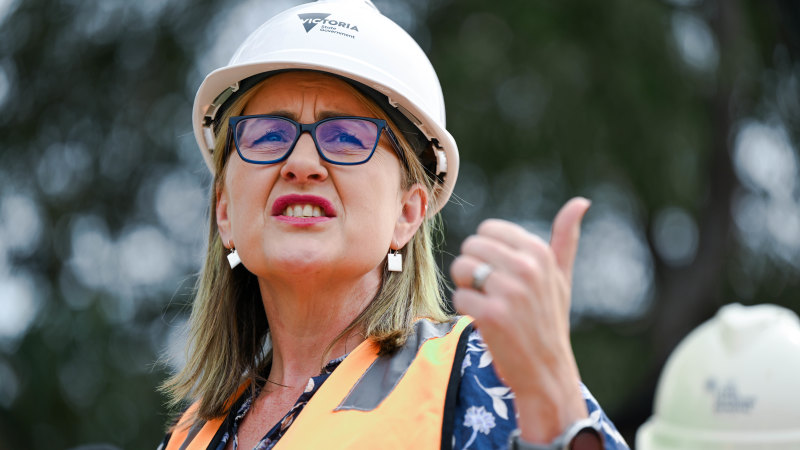Save articles for later
Add articles to your saved list and come back to them any time.
Victoria’s public service is infected by a culture of fear that stops many bureaucrats from giving frank and fearless advice to the state government.
That was one conclusion from Victorian Ombudsman Deborah Glass’ major report this week on how our government functions. Glass also found that bureaucrats were excluded from decision-making in favour of private consultants engaged to “prove up” the merits of the $200 billion Suburban Rail Loop.
Ask Labor MPs what they think of Glass’ findings and their response brings to mind a line from The Simpsons uttered by Principal Skinner. “Am I so out of touch?” he wonders. “No, it’s the children who are wrong.”
Responding to the report on Wednesday, Premier Jacinta Allan chose to focus on what it didn’t find rather than what it did.
Allan said Glass’ investigation had failed to prove “one example of partisan political hiring in the Victorian public sector”. She also framed the findings as “inferences”, “speculation” and “shade” being thrown on the Victorian public sector. She was not willing concede that any of Glass’ findings were a concern or worthy of addressing.
Sadly, the premier’s response was not entirely unexpected. It’s part of a growing trend over the past decade in which politicians show bravado instead of contrition when addressing findings of wrongdoing.What is most alarming here is that Allan and other Labor MPs genuinely don’t believe that things are crook in this government.
The premier is right to point out that the report did not find evidence the public service had been stacked with partisan operatives, but it is replete with findings of what Glass described as a more pervasive politicisation. Examples of this include ministerial staff being appointed to senior public service roles without the job being advertised, and hiring panels tinkering with selection criteria to elevate certain people.
However, speak to any Labor MP and they’ll assure you that rather than being wrong, this is just how things are done. Political staffers agree. Which goes to the nub of the issue: this culture has become so normalised, so standard, that it isn’t viewed as a problem.
It’s a belief that seems to be based on the idea that the integrity chiefs simply don’t understand politics. They live in a utopia, trumpeting a holier-than-thou narrative with no understanding of the realities of political life, least of all a mandate.
This contempt for watchdogs like Glass flourished under former premier Daniel Andrews. Following the release of a report by the Independent Broad-based Anti-corruption Commission that concluded his government improperly awarded a lucrative contract to a union that then delivered an inadequate safety training program to health workers, Andrews dismissed the findings as “educational”.
While IBAC had stopped short of calling the government’s actions corrupt, the watchdog found evidence of unethical behaviour, misconduct and misbehaviour.
In his final speech last year, former Labor attorney-general Martin Pakula took a more overt swipe at integrity bosses, and what he called the “seemingly relentless trend” toward expanding the definition of what is considered improper.
Pakula warned against “lawyers and judges [becoming] the final arbiters of the appropriateness of political decisions” and encouraged MPs to “guard your sovereignty jealously [and] never forget that it is this arm of government that is formed by the will of voters”.
It is the easy option, of course, to dismiss critics as not understanding the realities of the job, and sometimes this argument has merit. But when a pattern emerges in watchdogs’ reports into your government, perhaps it’s time for some introspection.
Labor would do well to consider that these legal figures’ distance from day-to-day politics gives them a vantage point to see what those engaged in the daily grind can’t.
This is not the first report to highlight the problems in the upper echelons of the public sector and the centralised control stemming from the premier’s office. Glass concludes that this “creeping politicisation is a reality in Victoria, and requires urgent attention.” She notes that politicians ignore these findings at their peril.
Why should the public care about this? Because, ultimately, it means there are fewer checks and balances on the way our money is spent.
There is a cockiness within Labor that reports such as this rarely swing a vote. But MPs shouldn’t ignore the cumulative impact of integrity findings such as Glass’, which are shaping a broader perception about how Labor is running the state.
When faced with serious integrity findings, Premier Allan does not have to mirror the behaviour of her predecessor. Principal Skinner didn’t recognise it, but Allan still could: the children might be right sometimes.
Annika Smethurst is state political editor.
The Opinion newsletter is a weekly wrap of views that will challenge, champion and inform your own. Sign up here.
Most Viewed in Politics
From our partners
Source: Read Full Article

